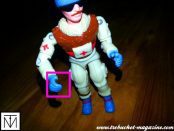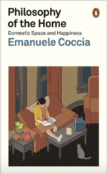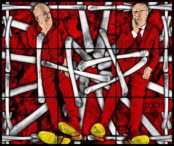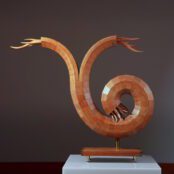[dropcap style=”font-size:100px; color:#992211;”]I[/dropcap]’m having problems with locomotion. In the last six weeks both my beloved bicycle and my beloved walking boots have finally given up the ghost and had to be replaced.
Then a week ago my motor failed its MOT so completely as to make repair uneconomical. And on Friday, when I was out on my new bicycle, I got hit by a car.
Not badly. I wasn’t hurt. But I was enraged and I swore quite a lot at the driver. He hadn’t looked. He pulled out straight into me. If he’d accelerated I’d have been toast. The worst thing was that I could see it all about to happen, like one of those dreams where you’re paralysed or moving through treacle. I think I may have croaked out an incredulous ‘no no no!’ but all I could do was watch.
[quote]my back wheel was pringled[/quote]
The mortified driver stopped and checked if I was OK but I was so angry I couldn’t face talking to him. I cycled off and it was only a mile later that I realised my back wheel was pringled, a mistake that has cost me forty quid. Not a good day.
But ever since I’ve been wondering what it all means. Why did my life suddenly and unexpectedly collide with that of a stranger? If I’d dawdled at home for just another thirty seconds it would never have happened. Why did he hit me? Maybe the shock of it (and he looked ashen) will ping his life in a quite unexpected direction. Maybe mine too. Maybe he saved me from the lorry round the corner.
The self-help/new age/pop-psychological habit is to literalise the metaphors. Our worlds collided. He knocked some sense into me, made me question my direction in life. Actually, we all do it but grasping at language in this way has always struck me as rather tenuous.
A mechanistic account would suggest that the collision was inevitable, that it was necessarily laid down in the starting conditions of the universe, that those events played out with rigid determinacy. If we could rewind time and set it all going again then that everything would happen exactly as before. The philosopher Henri Bergson derided such a view a hundred years ago, and I agree with him that it seems absurd.
[quote]I want to wrest meaning from the world[/quote]
All mainstream science would say on the subject is that the collision was random, one of those freak events that bedevil an uncertain universe. I can’t help it. I find such a view fundamentally unsatisfying. I want to wrest meaning from the world (though, of course, even by saying that such events are random and empty of content the naysayers are still engaged in a process of meaning-making – we can’t help ourselves: we make meaning even when we think we’re not).
If I have any philosophy of life then surely it is the art of hitch-hiking. The trick of getting a lift is not in persuading someone to stop. It is in being at exactly the right place at the right time such that the person who would give you a lift and is heading your way just happens to be passing. Being in the right place at the right time. The Taoist rule of thumb. Effortless not-doing.
Nothing beats the feeling of flow when lift gives way to lift and you’re carried to where you want to be. I got picked up in a stretch limo once. Really.
The hard bit is dealing with the times when it doesn’t , when you’re stuck by the motorway in the pissing rain and it’s getting dark, and someone looks right instead of left and you’re left wondering what hit you.
Sidebar Photo: Freedigitalphotos.net/sippakorn
A writer and a folk musician, Andy is the author of ‘Shroom: A Cultural History of the Magic Mushroom’ and has published a range of articles and academic papers on subjects as diverse as psychedelics, paganism, bardism, environmental protest, fairies, shamanism and evolution. A modern day troubadour, he plays mandolin, writes songs, and fronts darkly crafted folk band, Telling the Bees. A leading exponent of the English Bagpipes, he plays for brythonic dancing in a trio called Wod.






















